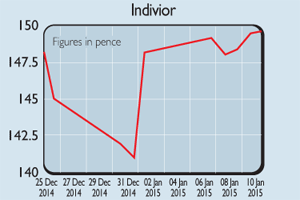Gamble of the day: A spin-off pharma
There are plenty of reasons why investors should worry about this spin-off pharmaceutical firm, says Phil Oakley. But it's all in the price.
Get the latest financial news, insights and expert analysis from our award-winning MoneyWeek team, to help you understand what really matters when it comes to your finances.
You are now subscribed
Your newsletter sign-up was successful
Want to add more newsletters?

Twice daily
MoneyWeek
Get the latest financial news, insights and expert analysis from our award-winning MoneyWeek team, to help you understand what really matters when it comes to your finances.

Four times a week
Look After My Bills
Sign up to our free money-saving newsletter, filled with the latest news and expert advice to help you find the best tips and deals for managing your bills. Start saving today!
In Joel Greenblatt's book, You Can be a Stock Market Genius, one of the ways he suggests that private investors can make money is to buy the shares of spin-offs. These are often smaller companies that have been cast aside by a larger parent company.
Spin-offs can be lucrative investments, says Greenblatt, because they tend to be ignored by professionals, who own larger companies. This means they often trade at cheap valuations, making them ideal for bargain hunters.
For example, if you own shares of household goods giant Reckitt Benckiser (LSE: RB) and haven't looked at your share dealing account recently, then you will find that for every share that you own, you have owned a share of pharmaceutical company Indivior (LSE: INDV)since 19 December last year.
MoneyWeek
Subscribe to MoneyWeek today and get your first six magazine issues absolutely FREE

Sign up to Money Morning
Don't miss the latest investment and personal finances news, market analysis, plus money-saving tips with our free twice-daily newsletter
Don't miss the latest investment and personal finances news, market analysis, plus money-saving tips with our free twice-daily newsletter
Reckitt decided to spin-off its pharmaceutical business to focus on its household products, such as Finish dishwasher tablets, Dettol and Nurofen, where growth prospects are better.
So what should you do with these shares if you own them? And if you don't, should you buy some?
Indivior's sales and profits are dominated by Suboxone a drug used to treat heroin addiction where profit margins are a very juicy 54%. The drug came off patent in 2010 and is under attack from cheaper generic versions but even so, a film-based version of the product still retains around a 60% share of the vital American market.
However, the outlook for Indivior in 2015 and 2016 isn't good. More competition to Suboxone has, or will, enter the market and is likely to lead to further falls in sales.

These relatively dim prospects help to explain Indivior's lowly stockmarket valuation of slightly more than £1bn about 3.8 times the last 12 month's net profits. Throw in around £500m of borrowings and the business has an enterprise value (EV) of around £1.5bn.
Before the spin-off last month, City analysts had predicted an EV of around £2bn-£2.5bn. Analysts are often wide of the mark, but is Indivior a little bit too cheap? Pessimists point to the falling profits and the fact that Reckitt couldn't sell to a trade buyer.
Those are valid concerns but they might be priced in. Also, the company should pay out around 40% of its profits in dividends, which should give it a reasonable yield.
In short, no one is expecting great things from Indivior. But it might just find a new blockbuster drug or be taken over. At 149p, it could be worth a punt.
Verdict: a risky buy
Get the latest financial news, insights and expert analysis from our award-winning MoneyWeek team, to help you understand what really matters when it comes to your finances.
Phil spent 13 years as an investment analyst for both stockbroking and fund management companies.
-
 Should you buy an active ETF?
Should you buy an active ETF?ETFs are often mischaracterised as passive products, but they can be a convenient way to add active management to your portfolio
-
 Power up your pension before 5 April – easy ways to save before the tax year end
Power up your pension before 5 April – easy ways to save before the tax year endWith the end of the tax year looming, pension savers currently have a window to review and maximise what’s going into their retirement funds – we look at how